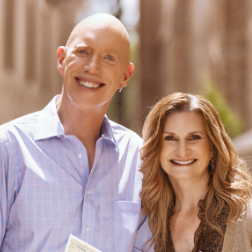Life Span vs. Health Span
Life span is the quantity. Health span is the quality.
Roger Daltrey wailed on The Who's first hit in 1965, "I hope I die before I get old." Fifty years later, Dr. Ezekiel Emanuel wrote a controversial essay for The Atlantic titled "Why I Hope to Die at 75." No, he isn't tired of living. Rather, his article examines the futility of staying alive as long as possible while burdened with years of poor health.

Recent data from the Centers for Disease Control (CDC) suggests that is precisely the direction most U.S. adults aged 55 and over are headed. 78% of adults in that category have one or more chronic conditions. The number jumps to over 85% for those beyond age 65.
These grim statistics are reflected in the average number of years Americans live (76.1) compared to the entire decade less they can expect to enjoy total health. Experts call this yawning gap the difference between life span and health span.
Life Span and Health Span
How long do you want to live? According to an Edward Jones and Age Wave study, nearly 70% of Americans say the answer is 100 years as long as they still have their health and a sense of purpose.
"The focus is on adding life to years, not just years to life."
Life span, how long we are alive, has increased by 20 years over the past century due to advances in medicine, sanitation and overall living conditions. These impressive gains, however, have not been accompanied by a proportional rise in health span.
Dr. Xiaojing Yang, an expert on biological age quantification techniques at Mydnage, describes health span as "the portion of a person's life spent in good health, without significant diseases or disabilities that impair their quality of life. The focus is on adding life to years, not just years to life."
Maximizing health span means maintaining one's physical and mental health, preserving cognitive function and minimizing the impact of age-related diseases.
Why Maximizing Health Span Is Important
Beyond the importance of extending the quality of life for individuals, the societal and economic implications of health span are substantial. As people age and face increasing health challenges, health care systems and economies are strained by the greater resource demand.
Not to mention the drain on one's retirement savings. The average American household has managed to save $87,000. Meanwhile, experts estimate that a couple may need $445,000 to cover yearly medical expenses and long-term care.
By increasing health span, we can potentially delay or reduce the burden of chronic diseases, enhance productivity and financial stability in older populations, and improve the overall quality of life for individuals and communities.
How We Can Increase Our Health Span
We are born with a unique genetic code, but scientists are learning that our DNA is not necessarily our destiny. While our genes doubtlessly influence our dispositions and tendencies, the growing field of epigenetics focuses on "how behavior and environment can affect the way genes work," says Becca Roses of MindBodyGenes.
It is exciting to know, says Roses, that "unlike genetic changes, epigenetic changes are reversible and can be influenced by factors like diet, exercise, stress and sleep quality."
"Increasing your health span comes down to increasing your quality of life through lifestyle choices."
Dr. Scott Katzman, orthopedic surgeon at N.J. Spine and Orthopedic, agrees. "Increasing your health span mainly comes down to increasing your quality of life through lifestyle choices," he says. "While certain diseases and most accidents can't be avoided, you can improve your chances of vital participation in your own life."
What exactly are those choices? Ways to be proactive about one's health include avoiding obesity, avoiding tobacco use and having regular medical checkups.
"One clear path is examining populations like the Blue Zones," says James Dixon, certified personal trainer at Fitness Brain in the U.K., "where large percentages of people live to be over 100 yet remain very active."
Here are critical common denominators from Blue Zone populations around the world:
- Diet is mainly plant-based. Daily consumption of legumes. Small portions of meat are served 4-5 times per month.
- Eating until 80% full
- Alcohol is avoided or consumed in moderation (usually red wine)
- Active lifestyle with vigorous movement through walking, work and daily chores
- Minimize stress through prayer/meditation, naps and regular interaction
- Extended family structure and supportive social networks
- Strong sense of purpose and faith in a higher source
Bridging the Gap
No one wants to live to 100 wracked with constant pain, disease, mobility issues and loneliness. Beyond improving lifestyle choices, many experts agree that a shift in medical care is essential to bridge the gap between life span and health span.
"Medical care isn't presently designed for the long-term conditions that emerge once we leave the prime health span," says Tiryaki. Roses agrees, advocating "a shift in health care from a disease-oriented approach to one that emphasizes prevention and wellness."
Researchers and start-ups devote enormous time and money to answering this call. New drugs like Ozempic are helping combat obesity. Urolithin A, a postbiotic produced in our gut microbiome, is promising to help kill off damaged cells that accumulate during aging. A new drug is about to be approved by the FDA to increase the longevity of dogs!
Life span is the quantity. Health span is the quality. A cooperative effort between individuals and health care providers, with both parties pulling their share of the load, will ultimately yield the optimal result — years filled with abundant health, purpose and energy.


